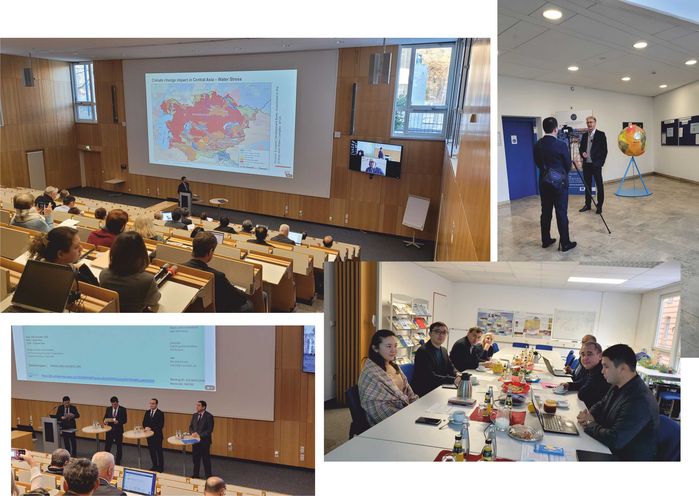5TH Tashkent water security Lectures
Within the framework of the CAWa-Green project and as part of the "Green Central Asia" program, the 5th Tashkent Water Security Lectures (TWSL) took place on 15 December 2022.
The TWSL was dedicated to the topic "Integration of scientific knowledge on water and land resources into policy dialogue on climate change adaptation in Central Asia".
More than 70 participants had the opportunity to listen to experts in this field and get to know the Green Central Asia Program better. The 5th TWSL took place as a hybrid event at GFZ in Potsdam together with many guests from Central Asia. We were very happy about the visit of Prof. Salokhiddinov, vice-rector of TIIAME National Research University in Tashkent. Together with Mrs. Marmsoler from the German Foreign Office in Berlin, Mr. Ludwig Stroink as Head of "Projects & International Affairs" -Executive Board of the Helmholtz Centre Potsdam and Mr. Oliver Bens as Co-Director CAIAG, GFZ Potsdam, he held the Opening and Welcome speeches.
Furthermore we could welcome representatives of the embassies of Kazakhstan, Kyrgystan, Tajikistan, Turkmenistan and Uzbekistan, who expressed their cooperation in Green Central Asia in short speeches.
The first session started with Dr. Caroline Milow as a Progamme Coordinator of Green Central Asia, (GIZ), followed by Dr. Abror Gafurov , CAWa-Green Project Coordinator. During the day, participants had the opportunity to hear many more scientific presentations from partners of the Green Central Asia project. The complete list of speakers and presentations can be found here.
The key message of this TWSL was that climate change is affecting water resources in Central Asia (CA) and scientific information is necessary to promote policy dialogue in this regard. Observations of water resources in Central Asia remain limited, and alternative approaches such as remote sensing are becoming increasingly important for modeling. The presentations were followed by a lively panel discussion with representatives from the Central Asian embassies, which ended with mutual agreement on the need and motivation for strengthening future collaboration between the CAWa-Green project and the various research institutes, government agencies, and hydrometeorological services in the various Central Asian countries, with full support from all embassies.
